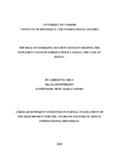| dc.description.abstract | A country's foreign policy, also called foreign relations policy, consists of self-interest strategies
chosen by the state to safeguard its national interests and to achieve goals within its international
relations. The external environment and issues such as international and internal terrorism, cyber
crime, natural and human-made disasters, organized crimes like piracy and globalization have
shaped the foreign policies of many countries, especially those that have been victims like the USA
and Kenya. The direct causes of terrorist attacks in Kenya are majorly to the porous borders due to
poor policing, politically unstable neighbouring countries like Somalia and South Sudan, a
relatively open and multicultural society, relatively good transport and communications
infrastructure, large Muslim population and the political and socioeconomic deprivation of the
coastal population relative to the rest of the country are some of the factors that boost acts of
terrorism in Kenya.
The study seeks to establish the role of emerging security issues in shaping the implementation of
foreign policy goals: a case of Kenya. The study will be guided by the following objectives: to
identify and examine the key emerging security issues that are shaping foreign policy
implementation in Kenya; to investigate the effects of external and domestic security environments
on foreign policy implementation in Kenya and to establish the role of state and non-state actors in
shaping Kenya’s foreign policy in relation to emerging security issues.The study will adopt
explorative research survey and the study population will include security agencies, employees in
the Ministry of Foreign Affairs and International Trade and the General public.
Simple stratified random sampling will be used to come up with a sample of 100 respondents. The
study will collect primary data using interview guide and semi-structured questionnaires with both
open-ended and closed questions while secondary data will be obtained from analysis and review of
books, journals, papers and other available literature on the role of emerging securities issues in
shaping the implementation of foreign policy goals in Kenya. Quantitative data will be analysed
using the Statistical Package for the Social Sciences (SPSS) computer software (v 20), while the
qualitative data will be analysed by content analysis. Data will be presented using tables and
figures. | en_US |

